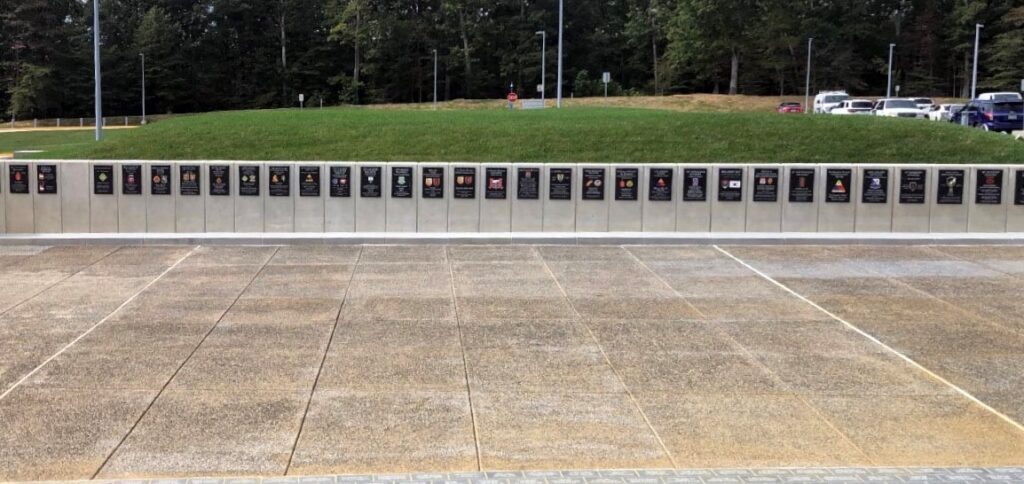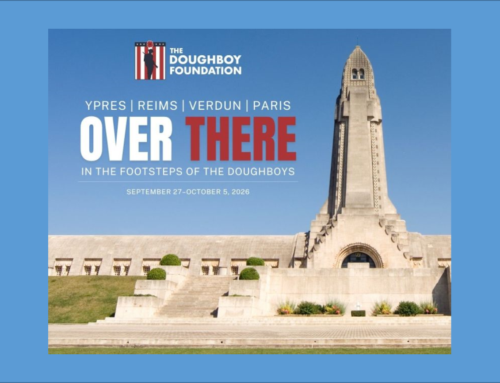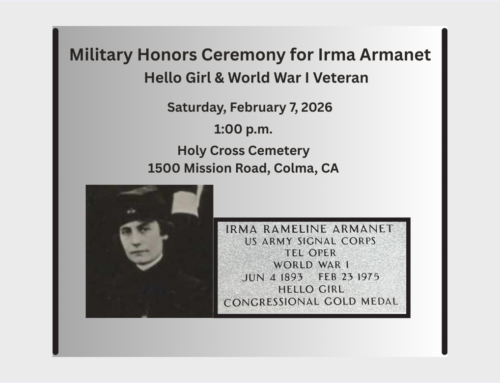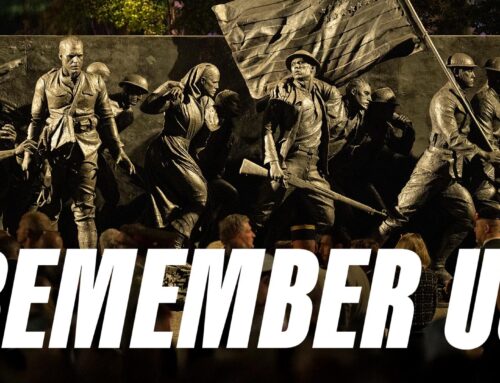National Museum of the US Army at Fort Belvoir, VA to dedicate Unit Tribute to WWI “Hello Girls”
Published: 24 April 2025
By Dianne Smith
Special to the Doughboy Foundation website

Hello Girls Unit Plaque 1
National Museum of the United States Army, Fort Belvoir, VA
The recently opened National Museum of the United States Army at Fort Belvoir, VA, is an award-winning facility with the theme “Soldiers Stories,” highlighting the experiences of the men and women who have served since 1775. Along the walkway from the parking lot is a Wall of Honor holding unit tributes to active and historic military units.
On May 25, a new unit tribute will be dedicated to the Female Telephone Operators Unit, known popularly as the “Hello Girls.” Aside from medical personnel, they were the first all-female unit in the US Army and the first to directly contribute to combat operations in France and then post-war occupied Germany. A reception will begin at 1:30 in Veteran’s Hall, followed by a ceremony at 2 p.m., and an unveiling of the unit tribute along the Wall of Honor. A guided tour through the Nation Overseas gallery which covers World War I and Hello Girls memorabilia is available after the dedication.
People wishing to attend the event must RSVP by May 21 for tickets; click here to RSVP. Please note that the Museum has several policies and procedures to which all visitors must adhere; click here for more information.
Prior to World War I almost all telephone operators employed by AT&T were women. Because women were forbidden to serve in the military (other than the newly formed Army and Navy nurse corps) all telephone operators in the US Army were men. Yet when the American Expeditionary Forces deployed to France, they used newly-trained male personnel to staff these vital parts of the telephone network, even though Signal Corps men rarely manned switchboards and had never worked them in a combat environment. Ever worse, because of the Anglo-Franch coalition, many of these switchboard operators needed to be fluent in French – a skill not found in the pre-war Army.
General Pershing needed bilingual telephone operators who could handle the volume and pace of wartime signal operations. He “requested” (when a general does that, it is an order) the Army to recruit a small unit of women to serve as switchboard operators and real-time translators; over 7,600 women volunteered for the first 100 slots. Eventually, 223 women and 2 men would serve in wartime France and then some later in Occupied Germany through 1920. The Hello Girls ultimately served in operating units in the First, Second, and Third Army Headquarters (including during the Meuse Argonne Offensive) and connected over 26 million calls, averaging a speed of just ten seconds. That was six times faster than the men they replaced. Over 30 Hello Girls received individual commendations including Chief Signal Operator Grace Banker, who was one of 17 Signal Corps personnel awarded the Distinguished Service Medal (the Army’s third highest non-combat honor) for their wartime service. Two made the ultimate sacrifice for their country and are buried in military cemeteries in France.

(Left) A group of the WWI U.S. Army Signal Corps female telephone operators, known as the Hello Girls, operate a switchboard in France during WWI. The bilingual telephone operators enabled rapid tactical communication between French and American forces on the Western Front. (Center) General John Pershing, Commander of the American Expeditionary Forces in WWI, reviews a group of the Hello Girls. Pershing is reported to have said that the performance of the operators may have shortened the war by as much as a year, saving countless lives. (Right) Serving near the front lines during the late stages of the war, the Hello Girls were exposed to the dangers of the battlefield, such as artillery fire and poison gas. But after the war, the U.S. Army claimed that the Hello Girls had been “civilian contractors” rather than soldiers, and their requests for veteran’s status and benefits were denied for 60 years.
Returning home, thinking of themselves as Army veterans (and lauded as such in the popular press), they were in for a rude shock. Despite serving under commissioned (male) officers, wearing dog tags, rank insignia, and uniforms, swearing the Army Oath, and being subject to courts-martial, the Hello Girls were told they had served as “civilian contractors” instead of soldiers, thus denying them veteran’s status and benefits. Only after a prolonged struggle, in 1977, did Congress pass a law paving the way for the few surviving members to be recognized as full veterans of the US Army — in time to merit a veteran’s tombstone and a flag at their funeral.

In 1978, three WWI military telephone operators, known as “Hello Girls,” received honorable discharges as war veterans after a 60-year wait and a long struggle to obtain recognition for their efforts on behalf of the nation. From left, they are Marjorie McKillop, 81; Merle Egan Anderson, 91; and Alma H. Hawkins, 89; all of the Seattle area. (AP photo)
In 2024, Congress passed legislation to award the Hello Girls a Congressional Gold Medal, the oldest US award recognizing “exceptional achievements and contributions to the nation,” one of less than 200 bestowed since 1776 when the Continental Congress awarded the first to General George Washington.
It is “altogether fitting and proper” that on the eve of the 250th anniversary of the founding of the US Army, the brave women of the Female Telephone Operators, the “Hello Girls,” be recognized for their service.
Catherine Bourgin, granddaughter of Hello Girl Marine Edmee LeRoux, applauded the placement of the Unit Plaque at the Museum “I grew up knowing the family stories about my grandmother, Edmee LeRoux, but through modern genealogy research, my association with the WW1CC and the Hello Girls campaign, I’ve uncovered so much more—especially about her WWI military service. The Hello Girls were saluted by General Pershing and cheered by the Doughboys, recognition they truly earned through their courage, dedication, and professionalism as bilingual telephone operators in the U.S. Army Signal Corps. Supporting military operations and the Peace Talks, they proved women were more than capable and, in doing so, unintentionally reshaped American society for future generations.
“I am very happy that this Unit Tribute Plaque will remind future visitors to the National Museum of the United States Army about the brave service of my grandmother and all of the Hello Girls.”




